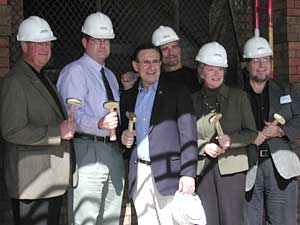|
Audio
Photos
More from MPR
|
 |
| St. Paul Mayor Randy Kelly attending a recent ground-breaking for an affordable housing project. (MPR Photo/Marisa Helms) |
St. Paul, Minn. — When Randy Kelly took office in 2002, he committed the city to provide 5,000 new units of housing in four years.
In the city council chambers the other day, Kelly announced the program had exceeded its goal. He said his program, called "Housing 5000," has created 5,032 new units.
"Perhaps one of the most worthy accomplishments that any of us elected officials can pursue," Kelly said, "is that which ensures shelter from the storm. It is the simple, human dignity of comfort; safety and security from the elements."
Kelly says the units will generate $6 million a year in taxes, and construction of the units is providing thousands of jobs.
Of the 5,000-plus units Kelly says are financed, 3,636 have actually been built, or 75 percent. Half the units are are rentals and half are owned.
Gunilla Bobb and her husband Gary recently bought a Housing 5000 unit, a townhouse on St. Paul's east side.
Before moving to St. Paul earlier this year, The Bobbs spent 23 years in the suburb of New Hope.
Gary Bobb says he and his wife like city life. They enjoy being able to walk to a grocery store or restaurant. And he says they like building community with neighbors from different cultures and backgrounds.
"Philosophically speaking, I think we've always wanted to live in the city," Gary Bobb says. "I personally believe, and I think Gunilla shares this belief, that the city is the future in America."
The Bobbs are the kind of professionals Kelly's Housing 5000 program is trying to attract -- residents who will increase the tax base and who will help revitalize St. Paul's neighborhoods.
Housing 5000 supporters say the program also hits its mark on affordability. More than 1,000 units -- 20 percent of them -- are affordable to low income people.
At a recent groundbreaking ceremony for the Crane Ordway building in St. Paul's Lowertown, city officials pounded gold painted hammers against some crumbling masonry. This 100-year-old factory is being renovated into 70 affordable units.
When finished next year, the efficiency apartments will rent for $400-$550 a month. They will be available to people making $15,000-$25,00 a year. Some people living there will be making even less. About a dozen units will be set aside for homeless people.
The nonprofit Central Community Housing Trust is developing this project. President Alan Arthur applauds Kelly for shepherding the city's ambitious housing goals.
"Affordable housing doesn't really get done, doesn't get implemented, unless a whole bunch of people are involved and supporting it and actually funding it," Arthur says. "In this case, the city of St. Paul, because it had a very concrete plan to provide 1,000 units of affordable housing throughout the city, they helped us with funding and just general political support for the project."
The Crane Ordway renovation is like most Housing 5000 projects. It's the result of several public and private partnerships including developers, banks, community organizations and city agencies.
And that's one reason why some say Kelly is taking too much credit for the projects.
Some of Kelly's critics, including city council members and Kelly's challenger in the mayor's race, Chris Coleman, say St. Paul was working on housing programs before Kelly came into office.
"The mayor is taking credit for the units of housing that have been built or will be built in the future, in the same way the rooster takes credit for the sunrise," Coleman says.
Former city councilmember Coleman says in 2001, the city was facing a housing deficit, so even before Kelly became mayor, officials had already said they would help build hundreds of new units a year.
"I don't stand here as a person who says that (Kelly) hasn't participated in that process or that he hasn't been helpful on that, I think he has," Coleman says. "But I also think that you have to look towards the leadership on the city council, you have to look at the leadership on the county and the state level. Clearly, there have been many, many partners in this effort."
Coleman says if he's elected mayor, he will find new strategies for keeping existing units affordable, including increasing access to federal housing subsidies.
Kelly has just announced planning is underway for an extension of the program, called Housing 6000. He says the new program will provide 6,000 more housing units by constructing 3,500 new units and refurbishing another 2,500 over the next four years. He says the new $1 billion project will cover a wide range of housing options, with an emphasis on affordability.







